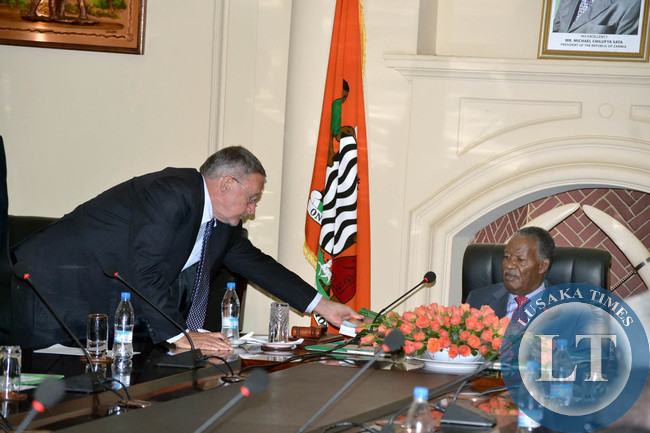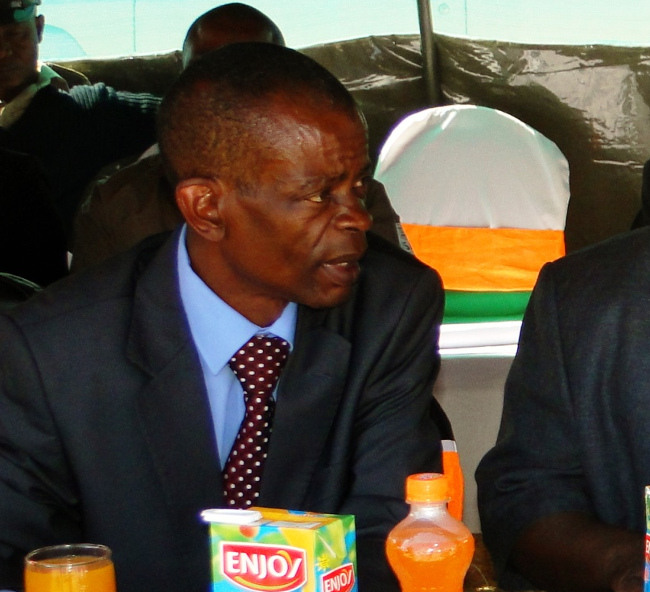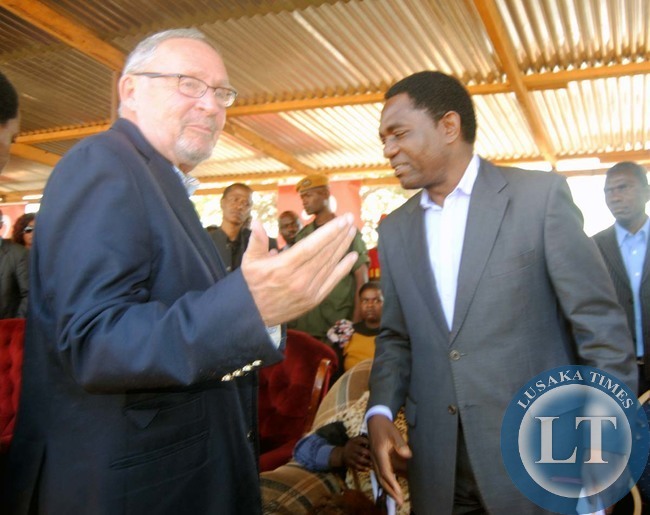
Mechanism (APRM) report from Vice President Dr Guy Scott at State
House in Lusaka
An attack on the rulers family
They say all good things come to an end. And there can also be an “au revoir” between the best of friends. Vice-President Dr. Guy Scott may well be thinking about that.After a nebulous and self-defeating reference to the President’s son, Mulenga Joel Sata—automatic heir to the throne if Zambia was a monarchy—Dr. Scott may have stuck his finger out in President Sata’s face!
Nothing beyond the understandable. Go into any memory bank of rulers (kings and presidents); they never take kindly to aspersions on their spouse and children. They perceive an attack on any member of their family as an attack on themselves. That’s just the way it is.
In a way, Shakespeare meant such a menu when he declared; “Uneasy lies the head that wears a crown.”
Whether it is American President Barak Obama or South African President Jacob Zuma, they all look an unattractive sight when their families are disparaged by anyone.Rulers know that any perceived sleight of hand against their household is a volatility that goes viral. It sends a huge statement out. Sometimes, it re-opens old wounds. In the case of Mulenga Sata, attention shifts to his mother, the distinguished former headmistress of the Kamwala Secondary School, sister of Zambia’s first international film actor, late Edwin Manda of the Touch of the Sun fame.
It will be significant to indicate that the movie; Touch of the Sun, a 1979 British-American comedy film was directed by Peter Curran and starring such names as Oliver Reed, Sylvaine Charlet, Peter Cushing and Wilfrid Hyde-White. Also released as No Secrets!, it was the story of an American space capsule which crash-landed into an African dictator’s territory. The ruler, Emperor Sumumba (acted by Manda), refuses to return it and demands a massive ransom. An American secret agent is assigned to recover it.
It explains why the Lusaka mayor’s response to Dr. Scott was fast and furious. He must have been badly hurt by his father’s friend, a man whom he probably endears as an “Uncle.” Two weeks in politics can be such a long time. A long time indeed, where, already, verbiage is changing!
Scott and Sata -inseparable until now
Perhaps until now, political communicators saw Dr. Scott as one you can liken to President Sata’s Siamese twin brother albeit in a different skin colour. The two were inseparable whether as smokers then, as MMD MPs and Ministers and as lone wolves at the formation of the Patriotic Front (PF).
Jocularly, some people even say PF for too long comprised only two people—Sata and Scott. Now Dr. Scott must meet the challenge of offending a King in ways that threaten what is among the greatest achievements of his Vice-Presidency—the glue that holds PF together. Until now.
A Biblical example of the sort of wrath Dr. Scott should expect from Mr. Sata is found in Esther 7 verses 6-10:
And Queen Esther (wife of the King) said, “the enemy is this very Haman (the King’s number two). So Haman was terrified before the king and queen. Then the king arose from his seat and went into the garden (not Israel), he was very angry. On his return, he found Haman had fallen across the couch where the queen was. Then the king said, “will he also molest the queen while I am in the house?” As the word left the king’s mouth, they covered Haman’s face (he was taken away to hang on gallows he had prepared for someone else).
In these matters of a ruler’s family, it is either their way or the Highway! Examples should abound in Zambia and questions asked on whether anyone who crossed successive First Families from Dr.Kaunda, Dr.Chiluba, Dr.Mwanawasa or President Banda’s era, was ever invited to a fete at Plot One.
Unfortunately for Dr. Scott, perceptions in politics are reality. Political communications’ tradition will judge his statement on Mulenga Sata as a roll-call of de-christening the Lusaka Mayor from a possible PF succession race.
Only Dr. Scott knows why as an experienced politician he put his job on the chopping block and roused controversy by inadvertently ensuring the PF does not have wider horizons in the event of a succession contest. Maybe he has the bit between his teeth. Why mention a Lusaka mayor and a Kabwata MP who are not even cabinet ministers?
Whether Dr. Scott likes or loathes this discourse, his statement on Mulenga Sata possesses the asset of unmatched timing. He mentions names outside whatever Cabinet inner circle and fingers the President’s son.
Could it be that in PF circles Mulenga Sata and Given Lubinda are the names being bandied about in the event of a PF succession race? Curious succession elimination, then—Or else let someone prove that it’s reasonably possibly true no such malice was intended.
Whatever Dr. Scott’s political reasoning, he may not escape the judgment—albeit misinterpretation—of a king for his rails against his son without looking in the mirror and understanding the potentially devastating effects of bounded rationality.
On his return from a far-off land, the king who may have thought “surely, they will respect my son,” will most likely look up at Dr. Scott’s statement on Mulenga Sata, with a scowl.
And yet all credit to Dr. Scott, he has served us well as Zambia’s first Caucasian Vice-President since Independence: he gave us a light complexion that amazed the world, he has run his race but maybe this too is fast coming to an abrupt end.
By Samuel Ngoma
________________________________________________________________
The Author is a veteran Zambian Journalist and former diplomat to Belgium
________________________________________________________________















